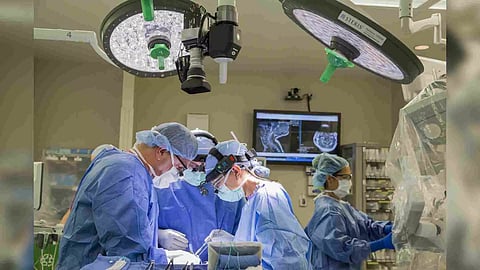

CHENNAI: Two cutting-edge technologies - paediatric endoscopic (endonasal and neuro-endoscope) neurosurgeries and intraoperative neuro-monitoring (IONM) - are reshaping the landscape of paediatric neurosurgery, empowering surgeons to achieve unparalleled precision and excellence in patient outcomes while offering hope and reassurance to families facing neurological challenges.
Explaining the procedure, Dr Vishwaraj Ratha, consultant neurosurgeon at SIMS Hospital, says paediatric endoscopic neurosurgery is a minimally invasive technique revolutionising the treatment of many paediatric neurological conditions.
“Traditionally, neurosurgical interventions necessitated large incisions and extensive tissue disruption, leading to prolonged recovery times and increased risk of complications. However, with the advent of endoscopic technology, paediatric neurosurgeons can now access and treat lesions with remarkable precision through small incisions, minimising trauma to surrounding tissues and expediting the healing process.”
The benefits of paediatric endoscopic neurosurgery extend far beyond its minimally invasive nature. By providing surgeons with enhanced visualisation of the surgical field, endoscopic techniques facilitate more accurate tumour resection and cyst fenestration, with minimal handling of critical neural structures and thereby preserving the neurological function which in turn leads to improved patient outcomes and reduced risk of recurrence.
Dr Ratha says that intraoperative neuro-monitoring is one sophisticated tool that provides real-time feedback on neural integrity during surgery, allowing surgeons to make informed decisions to safeguard critical neural pathways. He adds that IONM acts as a vigilant sentinel, monitoring key neurological parameters such as motor and sensory function throughout the surgical procedure. By detecting subtle changes in neural activity before they manifest clinically, IONM enables surgeons to adapt their approach mid-surgery, minimising the risk of postoperative deficits and maximizing functional outcomes.